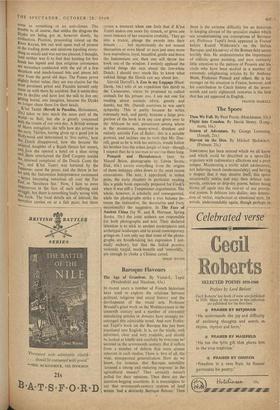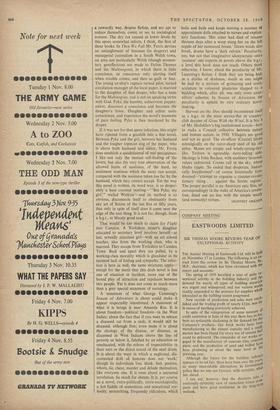with people of one's kind. It is a shame that
we are often so poorly served in so vital a field; and no woman alive would ever have the nerve to ask for her money back.
customer. All the Sunday •trading grocers to whom I have spoken have read and reread the Act and one quoted, almost verbatim, the Fifth Schedule, 1 (b), to me. It permits Sunday opening for the sale of 'meals or refreshments whether or not for the consumption at the shop at which they are sold, but not including the sale of fried fish and chips at a fried fish and chip shop.' This, he reasoned (like Mr. Cohen), per- mitted him to sell anything which is ready to eat, including (according to his logic) tinned soups ('some people like them cold') though not, of course, bouillon cubes or soup in packets. French mustard is legal, English mustard which needs mixing is not. Dog-food, however, is out— in spite of the fact that the various canine con- coctions need no preparation. Salad oil is per- mitted, but not cooking oil, margarine is legal, lard-illegal, and no one is very sure about frozen foods which, in the late 1940s when the Act was drafted, were too unimportant to be mentioned.
The real grievance of the grocers, delicatessen stores, chemists and others who open on Sunday (and provide a highly valued service to their neighbourhood) isahat they can, while open, sell A but not 13, X but not Y—and it is not until an inspector comes in and deliberately traps them over a particular item that they know for certain that they have broken the law. To add to the confusion, Jewish shopkeepers who observe the Saturday Sabbath can sell anything they like up. to 2 p.m. on a Sunday (always provided that they have registered their intention with the local authority) and mobile shops are not shops within the meaning of the Act.
If it is legal to sell aircraft spares, guide books at museums, stationery at stations, sports gear at sporting places, fodder for horses at the pub and bathing suits at the seaside in the summer, as well as laying on a complete funeral, not to mention booze at the appointed hours (even at the pharmacy if it has an off-licence)—if all this can be done without sacrilege to the Sabbath, why not bang the wedge right home and open up the shops that want to open without all these absurd ambiguities and pitfalls?
A much-loved tweed suit, no matter how shabby, can be almost as unsettling to put down as a beloved, ancient pet. Highland Home Indus- tries of Edinburgh have just revived a 'Personal Tweed Service' which helps solve this problem. All that the weavers require is a small piece of the old tweed sent by mail; they will copy it ex- actly in a seven-yard woollen suit length (they will not undertake the job for less).
Another side to this service is the weaving of an original tweed from a personal design. If the
Almost Never on Sundays
By LESLIE ADRIAN idea of owning a suit pattern that will never appear on anyone else's back is attractive to you, an Industries' adviser can help out by mailing samples from Edinburgh; shade cards for colours, and examples in twill, herring-bone, diamond and basket-weave. Once an original suit length has been woven, the pattern is put out of permanent circulation so that the wearer need never see it duplicated.
You will pay more for this 'couturier' service, but not outrageously—standard tweeds are 24s. 6d. per yard; the original designs are 35s. Miss E. Stewart of the Highland Home Industries, Ill a George Street, Edinburgh, in charge of the service, and is the person to contact for card samples. She will be in London from November 14 to 26 at the Industries' exhibition at the Ceylon Tea Centre, 22 Lower Regent Street, and will be taking orders direct for personal tweeds during that time.
It pays to 'go shopping' for coal. I discovered this as the result of a complaint from the makers of Rexco about a statement in this column a couple of weeks ago. Rather carried away by a predilection for round figures, 1 wrote that Rexco was Is. per cwt. more expensive than other pre- mium fuels. It would have been more accurate to say that Rexco costs between 8d. and 11d. per cwt. more than the others.
While checking round the coal merchants for the current Rexco prices, it became obvious that the cost of coal (clean or dirty) varied from dealer to dealer by several pennies a hundredweight. I do not know if there is any significance in the polite















































 Previous page
Previous page